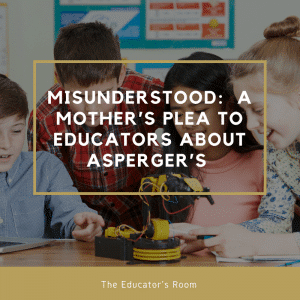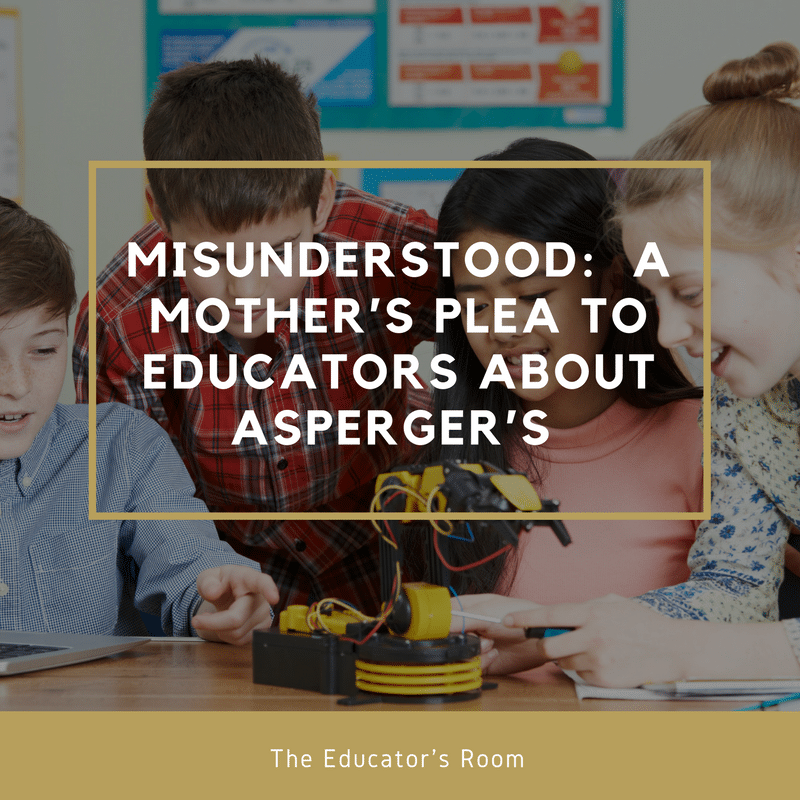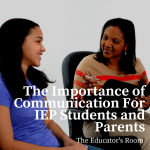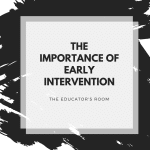In parts one and two of this series, I shared the story of my almost twenty-year-old son and his struggles and successes as a young man with Asperger’s Syndrome. In addition, I offered teaching tips for educators from a parent’s point of view. In this final installment, I will share more suggestions of how to make a child’s classroom experience more positive and productive. Once again, I must state that I am not an expert in Asperger’s, but I do have experience teaching and parenting students with this syndrome and have completed extensive research. Moreover, what I provide is generalized. The Asperger’s spectrum seems to be almost as wide as the entire Autism spectrum is. That is to say, there are varying degrees of Asperger’s, as far as how severe it presents in the child. In my son’s case, he has a mild case that caused major problems throughout his elementary and middle school years.
More Recommendations for Working with a Child with Asperger’s
- Many children with Asperger’s are very bright and may be labeled as gifted or as a genius. They have an astute intellectual curiosity and maturity beyond their peers. The paradox is that although they are gifted with extreme intellect, their social and emotional behavior is marked by immature, irritable, and what some may call “lazy” behaviors. Their interests can be very narrow, and they tend to focus on this specific area for long periods of time. To hear them speak (and these children love to talk about their interests), one would conclude that they are an expert in the field. The challenge is to gradually ease the student toward more diverse interests. They may be very unmotivated to complete certain tasks in school because they are not interested or are bored.
- Disorganization is a classic “symptom.” These students resemble the child with ADD or ADHD in that they do not innately know how to keep themselves organized and in the case of my son, he really does not care. Instead of forcing him to organize his school papers and binders my way (which he was very resistant to), I let natural consequences take effect. When he could not find his homework or papers and notebooks to study for a test, then I could slip in a few organizational tips and help him.
- Many students have short term memory issues. Multiple commands and requiring the child to complete several tasks at once can be difficult and overwhelming. As well, asking several questions in a rapid fire manner can cause frustration. Even today, I focus on one question at a time to give my son time to process.
- Learning social norms is a long and confusing process for the child. They have a tendency to be argumentative and to dominate conversations. They need frequent reminding, redirection, and practice, both at school and at home, of the appropriate “rules” of talking and working with others.
- It is imperative to help the other students in the class develop an understanding and compassion for why their classmate behaves the way he/she does.
- Breakdowns, meltdowns, and even temper tantrums can be a common occurrence, both at school and at home. Because many of these children often suffer from extreme anxiety, it is important that the special education teacher, guidance counselor, or mentor work with the child to appropriately manage their stress level. For my son, he suffered from extreme anxiety starting as early as preschool. However, the anxiety is often masked as defiance. In my opinion, intervention should first address any anxiety issues.
- Teachers must listen to parents and not second guess the diagnosis. Parents need to share triggers with teachers in order to prevent outbursts and frustrations.
- Allow the student to work independently as much as possible. Do not force the child to socially interact until they are mature enough and have the skill set to do so. In time, the child will develop a comfort level. It took my own child until high school to feel comfortable and to appropriately interact with his peers.
- Explore other options besides public school if the child is not functioning. Homeschool and private school may be options. My son’s father made tremendous sacrifices for him to attend a private high school, which I feel, literally saved his life. I realize that these options are not always feasible, but they are worth exploring.
As I stated in part two of this series, it is crucial that a team approach be used to work with Asperger children. It is not realistic, nor is it fair to the teacher or the child, to expect the classroom teacher to single handedly instruct and work on social behaviors with the child. Parents, guidance counselors, mentors, and special education professionals must work together. All involved must realize that you are planting seeds and may not reap a harvest within a school year. There is no easy “fix”.
And to tell you the truth, I didn’t really need to have my child “fixed”. What he craved was to be understood, to be respected, to have others appreciate his intellectual strengths, and to offer grace and patience as he muddled through life trying to find his niche.
I leave you with three outstanding resources to read whether you are a teacher or a parent of a child with Asperger’s.
- Look Me in the Eye: My Life With Asperger’s by John Elder Robison- a touching, humorous, and insightful memoir of a man with Asperger’s. The book offers hope and encouragement to the child or adult that is struggling to find their way. My son and I read this together when he was fourteen.
- Mockingbird by Kathryn Erskine is a young adult novel appropriate for fifth-grade students and above. It offers a realistic glimpse into the mind and world of a child with Asperger’s and how our individual differences are to be celebrated.
- The works of Dr. Temple Grandin, including her website
Dr. Grandin is a professor at Colorado State University and an Autism advocate. Her research is a must-read for parents of older children as you are planning post-high school plans.
[/fusion_builder_column][/fusion_builder_row][/fusion_builder_container]







